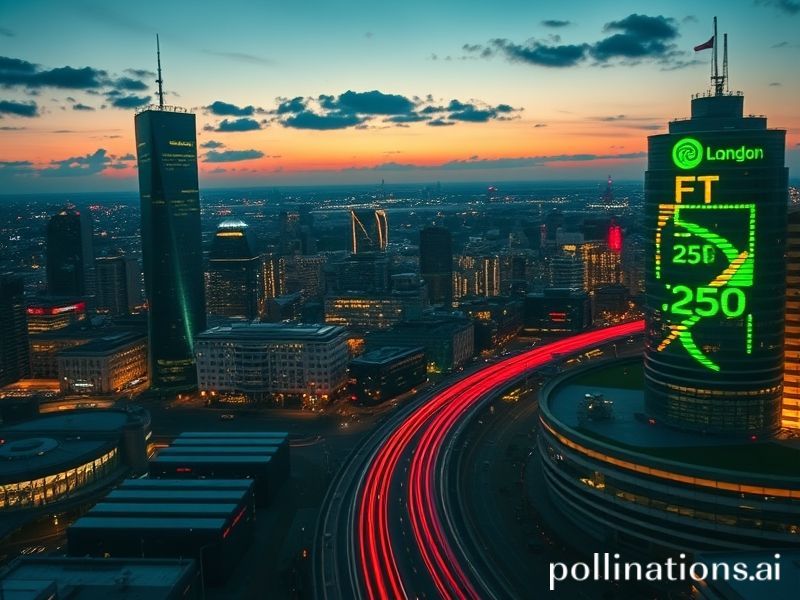FTSE 250: Britain’s Jan Brady Index Catches the World’s Next Nervous Breakdown
The FTSE 250: Britain’s Overlooked Middle Child in a World That Only Notices Extremes
By Our Correspondent, presently somewhere between a Pret and a Costa in Zone 2
It is fashionable, these days, to obsess over absolutes: the trillion-dollar mega-caps that orbit like bloated moons above the global economy, or the penny-ante crypto tokens that evaporate overnight like bad dreams. Somewhere in the tepid middle, however, sits the FTSE 250—London’s index of mid-cap stodginess—quietly minding its own business while the planet careers from one existential crisis to the next. Call it the Jan Brady of equity benchmarks: perpetually wedged between its glamorous large-cap sister (the FTSE 100) and the bratty AIM toddlers, forever asking, “Index, index, index, why is it never about me?”
Yet this middle child is precisely where the world’s tremors register first, the canary whose cough foreshadows the coal-mine explosion. The FTSE 250 is 250 British companies too big to be local gossip, too small to be geopolitical chess pieces. It is housebuilders who can’t pour concrete without a Brazilian iron-ore price spike; travel firms whose margins evaporate faster than a Bond-villain lair when the rand wobbles; and challenger banks whose mortgages are ultimately underwritten by the mood swings of the US 10-year Treasury. In short, the index is a seismograph for global neuroses—wrapped in polite Home Counties accents.
Consider the recent gyrations. When Silicon Valley Bank went belly-up, the FTSE 250 dropped 4 % in the time it took an American regulator to say “systemic risk”—a neat trick for an index whose constituents still think “cloud” is something that gets in the way of a cricket match. The rout proved, once again, that global capital markets now move at the speed of group chat, and the UK’s mid-caps are just the small print in the panic.
Meanwhile, China’s reopening—hailed in Davos as humanity’s second-wind—pushed the miners and luxury-goods purveyors inside the 250 up double digits, until everyone remembered that Beijing’s property sector resembles a Jenga tower assembled by toddlers on Red Bull. Cue the next slide.
And therein lies the international significance: the FTSE 250 is a leveraged play on the assumption that the world will not, in fact, implode this quarter. When the Middle East hiccups, oil prices spike, and suddenly the index’s sprinkling of North-Sea service companies look less like rusting relics and more like vital arteries. When the European Central Bank sneezes—say, by raising rates to levels last seen when Nokia ruled the earth—the UK’s domestically focused retailers catch pneumonia. It’s globalization wearing a waxed Barbour jacket: outwardly parochial, inwardly allergic to everywhere else’s chaos.
Brexit, naturally, added extra piquancy. Half the index’s revenue is earned overseas, so a weak pound—courtesy of whatever constitutional nervous breakdown Westminster is staging this week—gives exporters a sugar high. Conversely, any hint that Britain might rejoin the single market (spoiler: it won’t) sends the domestically tilted names surging, as if someone had promised to restock the national fridge after a decade-long diet of ideology.
International investors, bless their diversified hearts, treat the FTSE 250 like a leveraged ETF of “global growth, but make it quaint.” American pension funds park a sliver here for “international exposure” while simultaneously praying the Bank of England doesn’t discover a new inflationary demon under Liz Truss’s discarded diary. Asian sovereign wealth funds eye the dividend yields—still plumper than a Christmas pudding—and mutter darkly about currency hedging costs. Everyone pretends the UK is a rules-based haven, while quietly pricing in the possibility that the next prime minister will be chosen by a reality-TV vote on GB News.
So what does the FTSE 250 tell us about the state of the world? Nothing terribly uplifting. It suggests we remain tethered to each other by supply chains, sentiment, and sheer financial superstition. It proves that mid-sized companies—those allegedly closest to “the real economy”—are still puppets in a Punch-and-Judy show directed by central bankers, commodities traders, and whichever autocrat has the fastest internet troll farm. And it confirms that, for all our talk of decoupling and reshoring, capital still sloshes around the planet like gin in a first-class lounge: expensive, lightly regulated, and prone to spillage.
In the end, the FTSE 250 is neither hero nor villain—merely the world’s mood ring, tinted a queasy shade of British resignation. When the next crisis arrives—and it will—do not look to the mega-caps for early warning; they are too busy lobbying for bailouts. Instead, watch the overlooked middle child, dutifully recording every tremor with the weary air of someone who knows the grown-ups never learn. And if you must invest, remember: the index may be British, but the chaos is gloriously, terrifyingly global.







